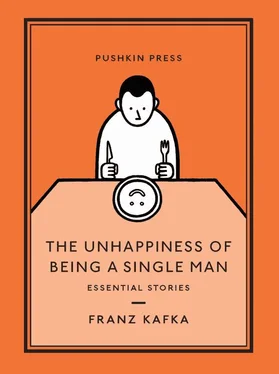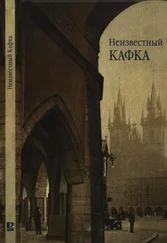His eyes were open, glassy, bulging and only just still working, while he himself was shaking and leaning forward as if someone was pushing or hitting him in the back of the neck; his lower lip, his whole lower jaw, was hanging down loose away from his gums, his entire face seemed to be coming apart; he was still breathing, albeit heavily, but then he fell back into the chair as if liberated, closed his eyes, the expression of some great effort crossed his face at the last, and then he was gone. I quickly leapt over to him and took his cold, lifeless, shudder-inducing hand; there was no pulse. So, it was all over. An old man. May our own deaths come as easily. But there was so much that had to be done right now! And in this haste, what to do first? I looked around for help; but the son had pulled the covers over his head and you could hear his endless sobbing; the sales rep, cold as a frog, sat there in his chair, two steps from N., visibly determined to do nothing and wait for time to pass; so there was only me who might do something, and the thing to do was the hardest thing of all, namely to give his wife the news in some way she could take, that is, in some way that didn’t exist anywhere on earth.
She brought in—she was still in her street clothes; she hadn’t yet had time to change—she brought in a nightshirt that had been warmed on the oven and that she wanted her husband to put on. “He’s fallen asleep,” she said, smiling and shaking her head, when she found us in this tableau. And with the boundless trust of the innocent, she picked up the same hand that I’d just touched with revulsion and shame, kissed it with marital playfulness and—while the three of us stared—N. shifted, yawned, let her put the nightshirt on him, tolerated with ironic annoyance her tender criticisms about having overexerted himself on the long walk, and, strangely enough, in order to give a different reason for having fallen asleep, said something about being bored. Then, so as not to catch a chill going through into the other room, he lay down for a moment in the bed next to his son; his head was bedded down next to his son’s feet on a couple of cushions his wife quickly brought over. After what had just happened, I didn’t think there was anything odd about it. Then he asked for the evening paper, took it despite the presence of his guests, but didn’t yet start reading, just glanced across the pages and told us, with astonishing acumen, some deeply uncomfortable truths about the offers we’d made, all the while making a gesture with his hand as if throwing us away and clicking his tongue to show us what a bad taste our behaviour had left in his mouth. The sales rep couldn’t stop himself from making a few poorly judged remarks; even his dull senses seemed to feel that, after what had just happened, things had to be brought back on track in some way, but with his crude manners that was never going to work. I said my goodbyes quickly; I was almost grateful to the rep for being there; without him I might not have had the decisiveness to leave so fast.
In the hallway I met Frau N. Seeing the downtrodden figure she cut, I said straight out that she reminded me a little of my mother. And when she didn’t respond, I added, “Whatever you might say about it, she could work miracles. Things that we’d destroyed, she made whole again. I lost her when I was still a child.” I’d intentionally spoken very slowly and clearly because I suspected the old woman was hard of hearing. But she must have been all but deaf, because she asked me in reply, “And how does my husband look to you?” From the few words we exchanged as I left, I also realized that she had me mixed up with the sales rep; I wanted to believe that she would otherwise have been a bit more forthcoming.
Then I went down the stairs. The way down was harder than the way up had been, and that hadn’t been easy either. Oh, what futile paths we’re compelled to tread as we go about our business, and how much further we have to carry our burdens.
BEFORE THE LAW there’s a gatekeeper. A man from the country comes up to this gatekeeper and asks to be admitted to the law. But the gatekeeper says that he can’t let him in right now. The man thinks it over and then asks whether he’ll be allowed to go in later. “It’s possible,” says the gatekeeper, “but not at the moment.” Since the door to the law is open, as always, and since the gatekeeper has stepped to the side, the man bends forward to look through the entrance and see what’s in there. When the gatekeeper notices, he laughs and says, “If you’re that desperate, you could try going in even though I’ve told you not to. But bear in mind: I’m very strong. And I’m only the lowest-ranking gatekeeper. From room to room there are more gatekeepers, each stronger than the last. Just the sight of the third one is more than I can take.” The man from the country hadn’t expected so much difficulty; after all, the law should be available to anyone at any time, he thinks, but as he takes a closer look at the gatekeeper in his fur-lined coat, at his big, pointed nose, his long, thin, black Tartar-like beard, he decides that he’d actually rather wait until he gets permission to go in. The gatekeeper gives him a stool and has him sit down to one side of the door. He sits there for days and years. He makes many attempts to be let in and tires out the gatekeeper with his pleas. The gatekeeper sometimes cross-examines him a little, asking him about where he comes from and many other things besides, but they’re detached questions, of the kind very grand people ask, and in the end he always says that he can’t let the man in yet. The man, who’d outfitted himself with all sorts of things for the journey, uses everything he has, no matter how valuable, to try and bribe the gatekeeper. The gatekeeper accepts it all, but says, “I’m just taking this so you don’t think there’s something you haven’t tried.” Over the course of these many years, the man watches the gatekeeper almost uninterruptedly. He forgets the other gatekeepers and begins to believe that this one is the only obstacle between him and the law. He curses his bad luck, loudly and recklessly for the first few years, then, later, when he gets old, he just grumbles under his breath. He becomes childish and, since he has studied the gatekeeper so long he’s familiar even with the fleas in his fur collar, he begs the fleas to help him change the gatekeeper’s mind. Finally, the light in his eyes grows weak and he doesn’t know whether it’s really getting dark or just that his eyes are tricking him. But in this darkness he can’t miss the splendour that pours inextinguishably out of the door to the law. He doesn’t live much longer. Before he dies, all his experiences from these many years gather in his head to form a question that he’d never asked the gatekeeper before. He waves him closer because he can no longer lift his stiffening body. The gatekeeper has to lean right down to him, since the size difference between them has grown much larger. “What is it you want to know now?” asks the gatekeeper. “You’re insatiable.”
“Everybody wants the law,” says the man, “so why is it that in all this time no one apart from me has asked to be let in?”
The gatekeeper can see that the man is near the end and, to get through to his failing hearing, he shouts at the top of his voice: “No one else could come in this way because this entrance was reserved only for you. I’ll go now and close it.”
IN THE PAST FEW DECADES public interest in the art of fasting has drastically declined. While it used to be very profitable to put on big, stand-alone exhibitions, doing so today would be completely impossible. It was another time. Back then, the whole city would get caught up in what the hunger artist was doing; the audience would grow and grow as the fast went on; everyone wanted to see him at least once a day; in the latter stages, you’d get fans who wanted to sit in front of the small cage from dawn till dusk; there were also viewings at night, with the effect heightened by flaming torches; on sunny days, the cage would be carried outside and children would be brought to see the hunger artist; whereas for adults he was often only a bit of fun, whom they went to see because it was fashionable, the children gazed at him in amazement, their mouths open, holding each other’s hands just in case something happened, while he, disdaining even a chair, sat on a scattering of straw, pale, in a black vest through which you could see his ribs sticking out, sometimes nodding politely, sometimes answering questions with an effortful smile, even stretching his arm out through the bars to let them feel how emaciated he was, then sinking back into himself, paying attention to nothing, not even the clock, which was the only furniture in his cage and struck the hours that were so important to him, but only staring into space with his eyes almost shut, and now and then sipping water from a tiny glass just to keep his lips wet.
Читать дальше












